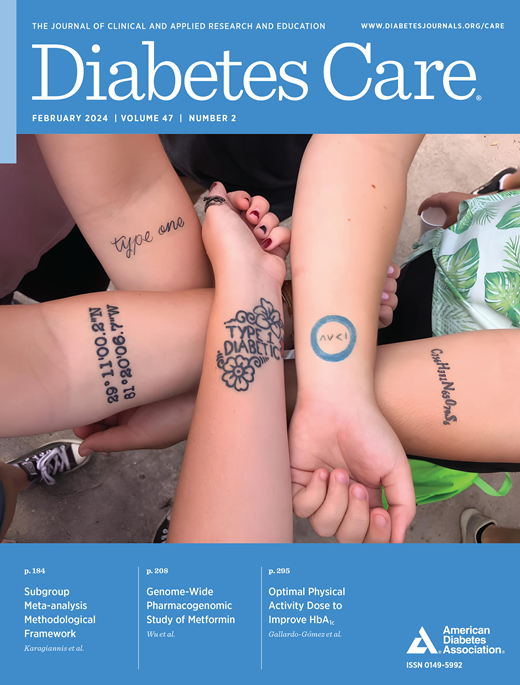Associations of Dietary Cholesterol Consumption With Incident Diabetes and Cardiovascular Disease: The Role of Genetic Variability in Cholesterol Absorption and Disease Predisposition
IF 14.8
1区 医学
Q1 ENDOCRINOLOGY & METABOLISM
引用次数: 0
Abstract
OBJECTIVE Whether genetic susceptibility to disease and dietary cholesterol (DC) absorption contribute to inconsistent associations of DC consumption with diabetes and cardiovascular disease (CVD) remains unclear. RESEARCH DESIGN AND METHODS DC consumption was assessed by repeated 24-h dietary recalls in the UK Biobank. A polygenetic risk score (PRS) for DC absorption was constructed using genetic variants in the Niemann-Pick C1-Like 1 and ATP Binding Cassettes G5 and G8 genes. PRSs for diabetes, coronary artery disease, and stroke were also created. The associations of DC consumption with incident diabetes (n = 96,826) and CVD (n = 94,536) in the overall sample and by PRS subgroups were evaluated using adjusted Cox models. RESULTS Each additional 300 mg/day of DC consumption was associated with incident diabetes (hazard ratio [HR], 1.17 [95% CI, 1.07–1.27]) and CVD (HR, 1.09 [95% CI, 1.03–1.17]), but further adjusting for BMI nullified these associations (HR for diabetes, 0.99 [95% CI, 0.90–1.09]; HR for CVD, 1.04 [95% CI, 0.98–1.12]). Genetic susceptibility to the diseases did not modify these associations (P for interaction ≥0.06). The DC-CVD association appeared to be stronger in people with greater genetic susceptibility to cholesterol absorption assessed by the non-high-density lipoprotein cholesterol-related PRS (P for interaction = 0.04), but the stratum-level association estimates were not statistically significant. CONCLUSIONS DC consumption was not associated with incident diabetes and CVD, after adjusting for BMI, in the overall sample and in subgroups stratified by genetic predisposition to cholesterol absorption and the diseases. Nevertheless, whether genetic predisposition to cholesterol absorption modifies the DC-CVD association requires further investigation.膳食胆固醇摄入量与糖尿病和心血管疾病发病率的关系:胆固醇吸收和疾病易感性中遗传变异的作用
目的 遗传易感性和膳食胆固醇(DC)吸收是否会导致DC消耗量与糖尿病和心血管疾病(CVD)的关联不一致,目前仍不清楚。研究设计和方法 通过英国生物库中重复的 24 小时膳食回顾来评估胆固醇的摄入量。利用Niemann-Pick C1-Like 1和ATP结合密码子G5和G8基因中的遗传变异构建了DC吸收的多基因风险评分(PRS)。此外,还建立了糖尿病、冠心病和中风的PRS。使用调整后的 Cox 模型评估了总体样本和 PRS 分组中 DC 消费量与糖尿病(n = 96,826 例)和心血管疾病(n = 94,536 例)发病率的关系。结果 每天多摄入 300 毫克 DC 与糖尿病(危险比 [HR],1.17 [95% CI,1.07-1.27])和心血管疾病(HR,1.09 [95% CI,1.03-1.17])的发生有关,但进一步调整体重指数(BMI)后,这些相关性消失(糖尿病的 HR,0.99 [95% CI,0.90-1.09];心血管疾病的 HR,1.04 [95% CI,0.98-1.12])。这些疾病的遗传易感性并未改变这些关联(交互作用的 P ≥0.06)。根据非高密度脂蛋白胆固醇相关 PRS 评估,对胆固醇吸收有更高遗传易感性的人群的直流电-心血管疾病相关性似乎更强(交互作用 P = 0.04),但分层相关性估计值在统计学上并不显著。结论 在对体重指数进行调整后,在总体样本和按胆固醇吸收遗传易感性和疾病分层的亚组中,食用直流电与糖尿病和心血管疾病的发生无关。然而,胆固醇吸收的遗传易感性是否会改变直流电与心血管疾病的关系还需要进一步研究。
本文章由计算机程序翻译,如有差异,请以英文原文为准。
求助全文
约1分钟内获得全文
求助全文
来源期刊

Diabetes Care
医学-内分泌学与代谢
CiteScore
27.80
自引率
4.90%
发文量
449
审稿时长
1 months
期刊介绍:
The journal's overarching mission can be captured by the simple word "Care," reflecting its commitment to enhancing patient well-being. Diabetes Care aims to support better patient care by addressing the comprehensive needs of healthcare professionals dedicated to managing diabetes.
Diabetes Care serves as a valuable resource for healthcare practitioners, aiming to advance knowledge, foster research, and improve diabetes management. The journal publishes original research across various categories, including Clinical Care, Education, Nutrition, Psychosocial Research, Epidemiology, Health Services Research, Emerging Treatments and Technologies, Pathophysiology, Complications, and Cardiovascular and Metabolic Risk. Additionally, Diabetes Care features ADA statements, consensus reports, review articles, letters to the editor, and health/medical news, appealing to a diverse audience of physicians, researchers, psychologists, educators, and other healthcare professionals.
 求助内容:
求助内容: 应助结果提醒方式:
应助结果提醒方式:


